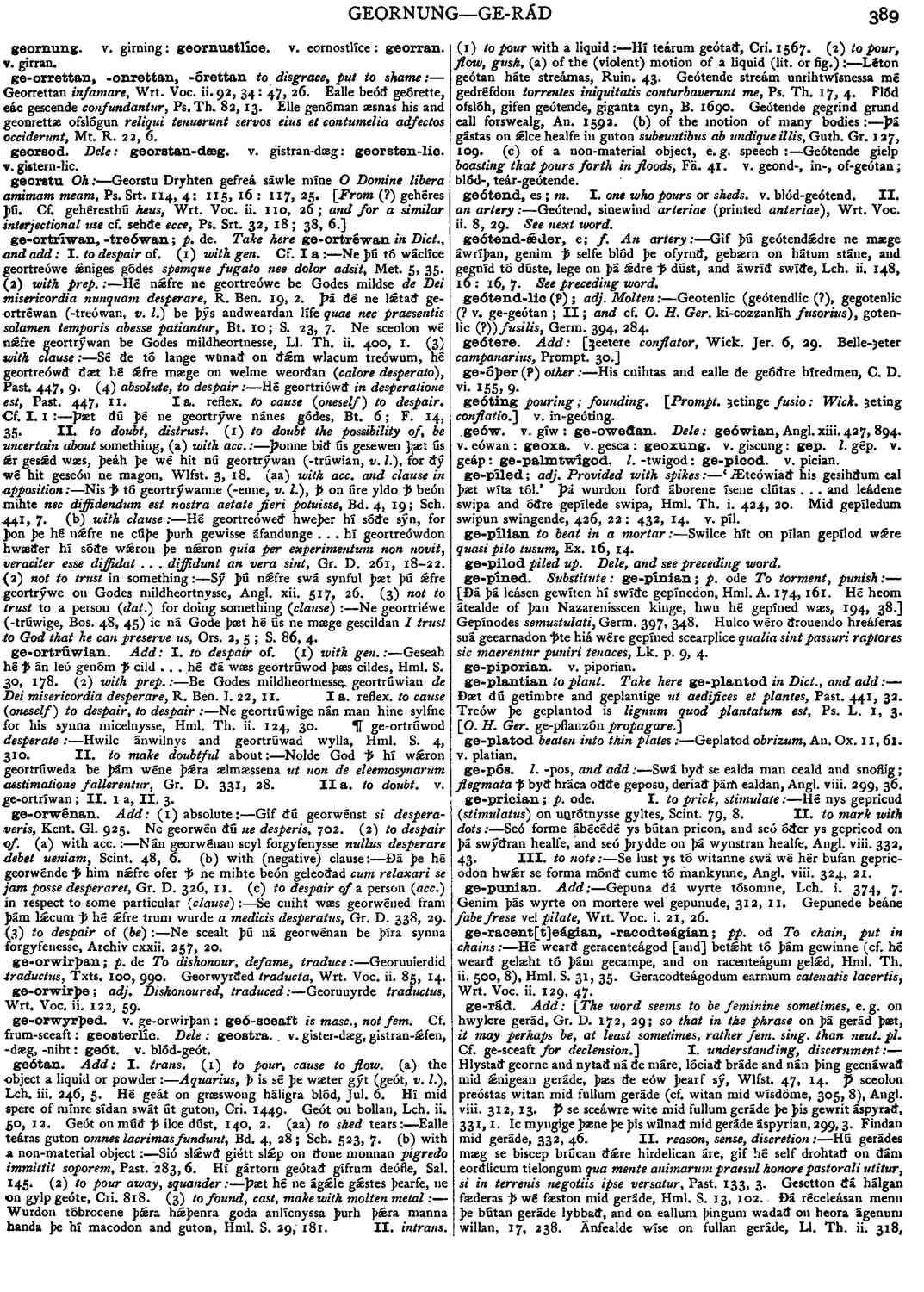ge-rád
- Gr. D. 172, 29; so that in the phrase on þá gerád þæt, it may perhaps be, at least sometimes, rather fem. sing. than neut. pl. Cf. ge-sceaft for declension.
-
Hlystað georne and nytað ná ðe máre, lóciað bráde and nán þing gecnáwað mid ǽnigean geráde, þæs ðe eów þearf sý,
- Wlfst. 47, 14.
-
Ꝥ sceolon preóstas witan mid fullum geráde (cf. witan mid wísdóme,
- 305, 8), Angl. viii. 312, 13.
-
Ꝥ se sceáwre wite mid fullum geráde þe þis gewrit áspyrað,
- 331, 1.
-
Ic myngige þæne þe þis wilnað mid geráde áspyrian,
- 299, 3.
-
Findan mid geráde,
- 332, 46.
-
Hú gerádes mæg se biscep brúcan ðǽre hirdelican áre, gif hé self drohtað on ðám eorðlicum tielongum
qua mente animarum praesul honore pastorali utitur, si in terrenis negotiis ipse versatur,
- Past. 133, 3.
-
Gesetton ðá hálgan fæderas ꝥ wé fæston mid geráde,
- Hml. S. 13, 102.
-
Ðá réceleásan menn þe bútan geráde lybbað, and on eallum þingum wadað on heora ágenum willan,
- 17, 238.
-
Ánfealde wíse on fullan geráde,
- Ll. Th. ii. 318,39.
-
Ic ne can hwilcere ændebyrdnesse and on hwylcre (hwylc, v.l.) gerád ꝥ beón mæg, ꝥ eall middaneard sý gesewen fram ánum mæn
non conjicere scio quonam ordine fieri potest, ut mundus omnis ab homine uno videatur,
- Gr. D. 172, 29.
-
Ic wolde ꝥ mé wǽre gecýþed on hwilc gerád (
quo ordine)
ꝥ mihte beón ꝥ ...- 149, 25.
-
Wé wyllað ámearkian þǽra twelf mónða naman, and gecýðan eall ꝥ gerád ꝥ heora gehwylcum folgað,
- Angl. viii. 305, 28.
- Stande on þæt ilice gerád on écnesse swá hwæt swá Críste geseald biþ on cyricena ǽhtum. Lch. iii. 444, 10.
-
Eádmund lét eal Cumbraland tó Malculme on ꝥ gerád ꝥ hé wǽre his midwyrhta,
- Chr. 945 ; P. 110, 34 : 1091; P. 226, 4.
-
Ealle þá men þe hié on ðeówdóme hæfdon hié gefreódon. on þæt gerád þæt hé him áðas swóran ꝥ . . . ,
- Ors. 4, 9; S. 190, 31.
-
Þá Pyhtas heom ábǽdon wíf æt Scottum, on þá gerád (ꝥ forewyrd, v. l. ) ꝥ. . . ,
- Chr. P. 3, 16.
-
Hí wurdon sehte on þá gerád ꝥ hé nǽfre eft Englisce ne Frencisce intó þám lande ne gelógige, 1093 ; P. 228, 28. IV a.
a condition
on which depends the performance of something, upon which a grant or the like is consequent :-- Ic wille eówres geunnan eów on þá gerád (geráde,- 196, 32) þe gé mé geunnan mines. Ll. Th. i. 198, 1.
-
Ꝥ hé hine on þá gerád (geráde,
v.l.
) feormige ꝥ hé hine tó folcryhte gelǽde, gif hé gylt gewyrce,- 204, 7.
-
Ꝥ þá ealle beón gearwe . . . tó farenne þider ic wille . . . on þá gerád ꝥ (geráde þe,
v.l.
) hý nǽfre eft on eard ne cuman,- 220, 8.
-
Ꝥ se hláford hine oþþe þá mágas on ꝥ ilce gerád út niman þe man þá menn út nimð þe æt ordále fúle weorðað,
- 238, 31.
-
On þá gerád ea intentione, Wrt. Voc. ii. 142, 20: Wülck. Gl. 87, l. Marius bæd þæt him mon sealde þone seofoþan consulatum and eác þæt gewin . . . Þá Silla geácsade on hwelc gerád Marius cóm tó Róme
Marius . . . adfectavit septimum consulatum, et bellum suscipere Mithridaticum, quo Sulla cognito,
- Ors. 5, 11; S. 236, 8.
-
Ꝥ man ágife þá ciricsceattas and þá sáwlsceattas tó þám stówum þe hit mid riht tó gebyrige. . . on þá gerád ꝥ (
in order that
) þá his brúcan æt þám háligan stówum þe heora cirican begán willað.- Ll. Th. i. 196, 10.
Bosworth, Joseph. “ge-rád.” In An Anglo-Saxon Dictionary Online, edited by Thomas Northcote Toller, Christ Sean, and Ondřej Tichy. Prague: Faculty of Arts, Charles University, 2014. https://bosworthtoller.com/49273.
Checked: 0